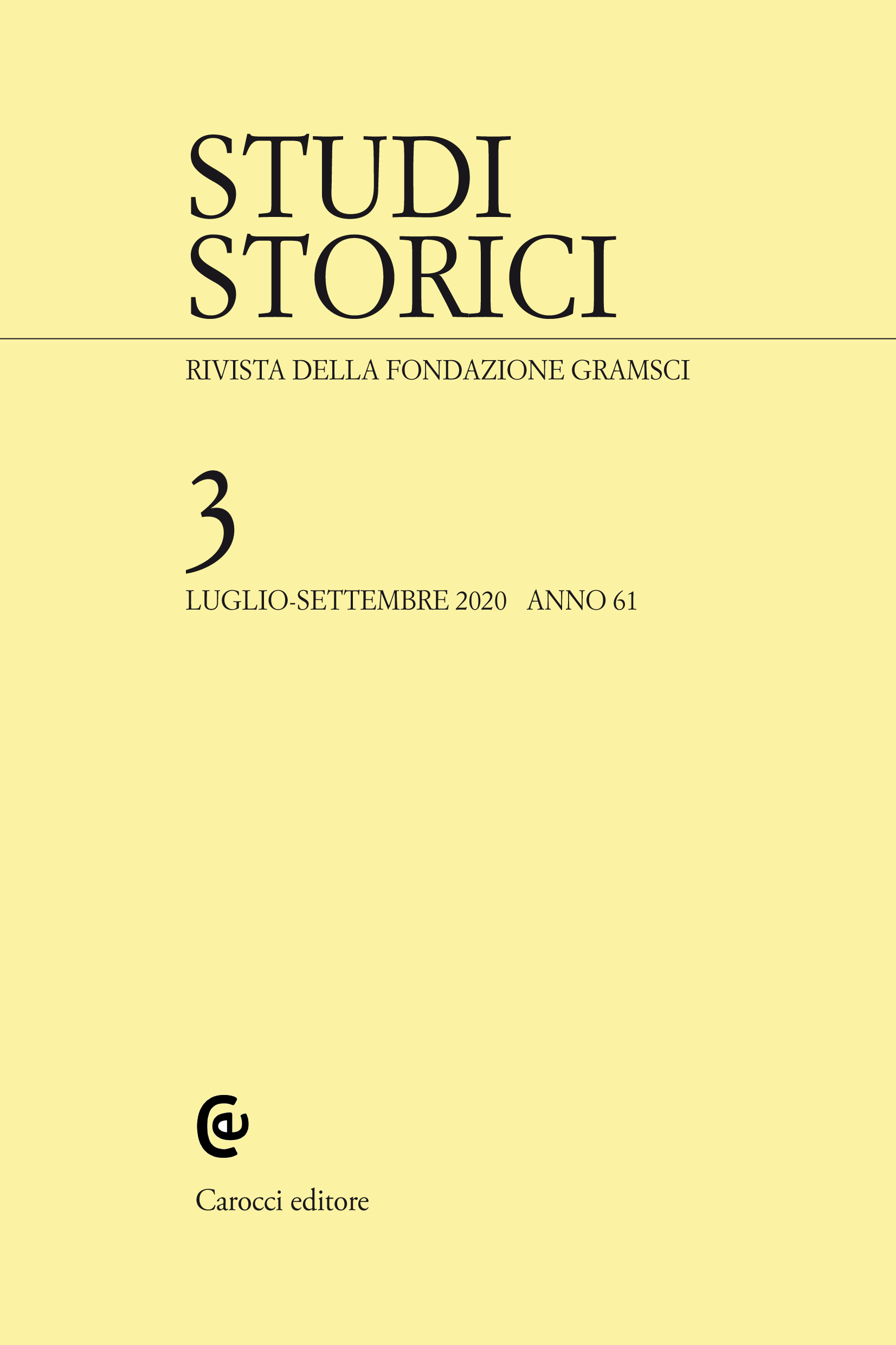
luglio - settembre 2020 anno 61
Sommario e abstract degli articoli
Negli interstizi degli stati regionali. Autorità centrali, signori e comunità nelle dinamiche della frontiera (XIV-XVI secolo)
m.d.m., pp. 569-579
Introduzione
In the Interstices of Regional States. Central Authorities, Lords and Communities in the Dynamics of the Border (14th-16th Century)
Introduction
This text is an overview of the historiographical background to put into perspective political relations at the borders of the Italian regional states from the fourteenth to the sixteenth centuries. This discussion starts from the debate of the 1990s, when studies stressed the pluralistic constitution of pre-modern states. It takes into account the evolving research on Renaissance diplomacy and armies, political exiles and information channels, and it explores the micro-historical approach, international studies, and the new views on the history of passions and political languages. The aim is to go beyond official relations between states and to frame an open and complex set of territorial, personal, and financial interactions between central powers and local protagonists. A notable variety of subjects were involved: lords, communities, factions and other networks, able to negotiate their position towards both their prince and foreign state authorities, to take advantage when a political crisis occurred, and to define their social identity and legitimacy in this wider political system.
Keywords: Late Middle Ages, Italy, Regional States, International Relations, Local Powers.
Parole chiave: Basso medioevo, Italia, Stati regionali, Relazioni internazionali, Poteri locali.
Francesco Bozzi, pp. 581-606
Figli devoti e amici fedeli. Il ruolo delle accomandigie nelle relazioni interstatali fiorentine (metà XIV-inizio XV secolo)
Devoted Sons and Faithful Friends. The Role of the Accomandigie in Florentine Inter-State Relations (Mid-fourteenth – early Fifteenth Centuries)
The paper aims to investigate the role played by the treaties of accomandigia in the Florentine international relationships between the mid-fourteenth and early fifteenth centuries. Through the accomandigie, the Republic tied itself to different political realities, from rural lordships to other states. Florence oriented the creation of such ties towards different territorial areas and made different uses of them, depending on the context. The accomandigia was therefore a tool with which to enhance its presence within a certain territory (such as in Romagna) or with which to respond strategically to the movements of its opponents (as in Lunigiana and in the Sienese countryside). Finally, in the case of the relationships with Montefeltro and Piombino, the accomandigia may be seen not as a support mechanism, but as the true substance of the interstate relations.
Keywords: Late Middle Ages, Central Italy, Florence, Accomandigia, Lordships.
Parole chiave: Basso medioevo, Italia centrale, Firenze, Accomandigia, Signorie.
Massimo Della Misericordia, pp. 607-643
«Molestia di soi superiori». Relazioni interstatali, gerarchie politiche e appartenenze sociali fra Milano, Svizzera, Vallese e Grigioni nel XV secolo
«Molestia di soi superiori». Inter-state Relations, Political Companies, and Social Identities between Milan, Switzerland, Valais and Grisons in the Fifteenth Century
The article concerns political relations between the Sforza dominion and its alpine neighbors. Many actors operated within and across the frontiers: lords, state officials, communities and so on. International relations gave these protagonists the opportunity not only to promote bold political initiatives, but also to outline their identity. A community, a jurisdictional district, a fiefdom, and finally a state were not statically defined entities, but configurations in the making. The same hierarchy of powers in the state was remolded, because reprisals and collective responsibility for damages suffered by foreigners could strengthen the solidarity between the duke, the officials and the subjects, but periodically the subjects reacted by promoting initiatives that were so autonomous that even the subordination to the prince was put into question.
Keywords: Fifteenth Century, Lombardy, Switzerland, Community, Identity Dynamics.
Parole chiave: Quattrocento, Lombardia, Svizzera, Comunità, Dinamiche identitarie.
Matthew Vester, pp. 645-679
René de Challant and Renaissance Lordship
René de Challant and Renaissance Lordship
An understudied aspect of Renaissance lordship is its transregional dimension. Some sixteenth-century lords, such as René, count of Challant, held lands that were geographically dispersed and situated within multiple jurisdictional contexts. His status as lord of Valangin injected personal and familial elements into René’s diplomatic and military role in Sabaudian- Swiss politics. Litigation over his landed claims in different parts of Europe drew him into relationships with a host of political actors. Likewise, the territorial configuration of his fiefs affected revenue collection and accounting in ways that impacted his interactions with other princes. Consideration of transregional lordship further complicates our understanding of the development of sovereign authority and its relationship to dynastic interests. Keywords: Renaissance, Savoy, Challant, Lordship, Transregional.
Keywords: Renaissance, Savoy, Challant, Lordship, Transregional.
Parole chiave: Rinascimento, Savoia, Challant, Signoria, Transregionale.
Ricerche
Fabrizio La Manna, pp. 681-707
Soggetti e contesto. Nobili, notabili e dimensione urbana nella Sicilia del 1848
Subjects and Context. Nobles, Notables and Urban Dimension in Sicily in 1848
The essay focuses on the Sicilian revolution of 1848. It underlines the dynamics of the social classes that characterise the start of the uprising and the risulting institutional stabilization, which was due especially to enlarged base of consensus. The central importance of urban dimension, the role of notables and popular mobilization (through the involvement of the abolished handicraft corporations) are the essential elements that characterise the main insurgiencies during the Risorgimento. All these elements were to be particularly important in 1848. Indeed, the cultural and professional élites not only joined the revolutionary movement, but they also took command very quickly. Nevertheless, the relationship between the élites and the people required historical figures able to mediate.
Keywords: 1848, Revolution, Sicily, Urban population, Notables.
Parole chiave: 1848, Rivoluzione, Sicilia, Popolazione urbana, Notabili.
Valerio Strinati, pp. 709-739
Viscere della terra, viscere della società: la scoperta del lavoro infantile nelle solfare siciliane (1873-1879)
Bowels of the Earth, Bowels of Society: the Discovery of Child Labour in Sicilian Sulphur Mines (1873-1879)
In Italy in the 1870s, government inquiries and parliamentary discussions highlighted the problems of the industrialization process, including the absence of protective laws on child labour. In particular, the Committee for Industrial Inquiry, visiting Sicily (1873) was affected by the dramatic condition of the carusi, children employed in sulphur mines and involved in the transport of the mineral from the mines to the surface. Concluding the investigation on Sicily conducted along with Leopoldo Franchetti (1876), Sidney Sonnino invoked protective laws against the exploitation of the carusi, while, at the same time, the parliamentary committee of inquiry on public order in Sicily was more sensitive to the owners’ arguments against setting legal limits to the employment of carusi.
Keywords: Carusi, Child Labour, Sulphur Mines, Social Legislation, Sicily.
Parole chiave: Carusi, Lavoro minorile, Solfare, Legislazione sociale, Sicilia.
Alessandro Santagata, pp. 741-775
Santa Sede, diritti umani e perestrojka nella pubblicistica cattolica europea (1985-1989)
Holly See, Human Rights and Perestrojka in the European Catholic Debate (1985-1989)
The paper aims to investigate the public debate concerning the cultural and political role played by the Holly See during the Gorbachev era, focusing on the Vatican engagement in the international human rights campaign. With research based on some of the most important European Catholic reviews, it will thoroughly analyse some turning points in the second half of the 1980s: the Conference on Security and Cooperation in Europe the celebration of the Millennium of the Christianization of Rus’; the forums of dialogue between Catholics and Marxists, and the debate over the new Soviet law on religious freedom. The paper will analyse the Vatican’s positions and the discussion in the Catholic public opinion. The main objective will be to study the moments of dialogue, the cross-pollination between the two partners and their effects in international Catholicism.
Keywords: Holy See, Catholic Magazines, Human Rights, CSCE, Gorbachev.
Parole chiave: Santa Sede, Riviste cattoliche, Diritti umani, Csce, Gorbačëv.
Opinioni e Dibattiti
Marina Garbellotti, pp. 777-804
La famiglia italiana di età moderna, una realtà multiforme. Percorsi di ricerca nell’ultimo ventennio
The Italian Family in the Modern Age: a Multiform Reality. Research Paths over the Past Twenty Years
The essay aims to offer an overview of family history studies in Italy over the past twenty years, exploring the following topics in particular: the role played by affections in modulating family logic and the household’s flexibility to adapt in order to increase or optimize economic resources; the forms of assistance that were given to the family and the ways to obtain them, including by legal procedures; the attention paid to siblings and the role of the elderly, which from a historiographical point of view we might define as ‘new’ relatives; and non-biological parental relationships, which is to say the forms of foster care and adoption practiced in modern times.
Keywords: Historiography, History of Family, Early Modern History, Italy.
Parole chiave: Storiografia, Storia della famiglia, Storia della prima età moderna, Italia.
Sfoglia gli altri numeri dell’anno 61 / 2020
Elenco dei fascicoli pubblicati dal 2010
Seleziona fascicolo...
- anno 65 / 2024
- 1
- anno 64 / 2023
- 1
- 2
- 3
- 4
- anno 63 / 2022
- 1
- 2
- 3
- 4
- anno 62 / 2021
- 1
- 2
- 3
- 4
- anno 61 / 2020
- 1
- 2
- 3
- 4
- anno 60 / 2019
- 1
- 2
- 3
- 4
- anno 59 / 2018
- 1
- 2
- 3
- 4
- anno 58 / 2017
- 1
- 2
- 3
- 4
- anno 57 / 2016
- 1
- 2
- 3
- 4
- anno 56 / 2015
- 1
- 2
- 3
- 4
- anno 55 / 2014
- 1
- 2
- 3
- 4
- anno 54 / 2013
- 1
- 2
- 3
- 4
- anno 53 / 2012
- 1
- 2
- 3
- 4
- anno 52 / 2011
- 1
- 2
- 3
- 4
- anno 51 / 2010
- 1
- 2
- 3
- 4
